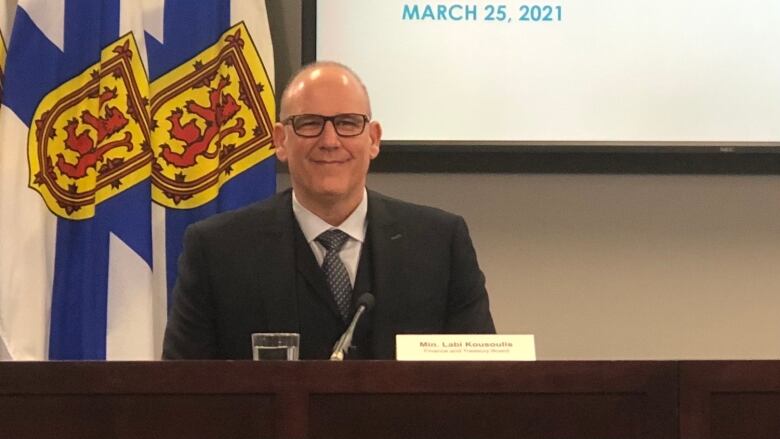N.S. budget has big increases for long-term care, mental health, income assistance
Spending estimates include $12.4 billion in expenses, $584.9-million deficit

Nova Scotia Finance Minister Labi Kousoulis tabled a budget on Thursday that he says will lead the province back to balance within four years, but it will also drive it deeper into debt during that same period.
The budget has all the makings of a pre-election document, with major spending increases in several areas, most notably long-term care, home care, mental health and addictions services, and income assistance rates.
With estimated revenues of $11.8 billion and expenses of $12.4 billion, the estimated $584.9-million deficit improves on where 2020-21 ended, at $705.5 million.
The net debt is estimated at $18 billion, and is projected to grow to $21.2 billion by 2024-25.
With job numbers returning to near pre-pandemic levels, Kousoulis said the budget includes no new fees or taxes, or increases to existing ones, all while addressing areas of need he said will help the province continue to weather the pandemic.
"We are striving to keep life affordable for all Nova Scotians and their families," he said during his budget address.
The Liberal government is approaching the four-year anniversary of its current mandate, and Premier Iain Rankin has until spring 2022 to call an election.

As always, health spending drives the budget. The Health and Wellness Department budget tops $5 billion for the first time, coming in at an estimated $5.3 billion.
That spending includes $1.02 billion on long-term care and home care, up $119.6 million from last year.
There is money to act on recommendations from the long-term care expert panel report and $8.6 million to start the multi-year plan to replace or renovate seven nursing homes and add 230 beds across the province by 2025. The province will spend $3.9 million this year to cover money long-term care homes lost during the pandemic.
There is $12.2 million to train more doctors, with a focus on rural communities and First Nation and African Nova Scotian populations, and another $2 million to increase orthopedic surgeries.
Mental health, addictions
Spending on mental health and addictions services is going up by $19.2 million to $336.5 million. That includes $12.3 million for new programming.
New programs include regional hubs for addiction services to be hosted at health authority locations.
Department officials say that will include the expansion of services already available in Yarmouth, Digby and Shelburne counties, the creation of two hubs in the Halifax/Dartmouth area, one in Truro and a combination of services throughout Cape Breton Regional Municipality.
The hubs will focus on a bundling of withdrawal management services, including harm reduction support and support for families.
The department is also beginning work on the development of a single-session therapy program, which will serve people with mild to moderate mental health issues. Officials say the intention is same day or near-time appointments without a referral. There would be integration with more intensive services. There is no launch date yet for the service.
Income assistance
The budget includes the single largest increase in the history of the income assistance program.
Beginning in May, every adult will see a $100 per month increase to the standard household rate, a change that will cost $35.2 million.
Community Services Department officials say that represents a 12 to 20 per cent increase to the amount a household receives, depending on composition. Increases in the past have ranged closer to two to five per cent.
Kousoulis told reporters that a key priority in drafting the budget was helping people who needed it most.
"We looked at our poverty rates, we looked at trying to make a significant impact in the lives of Nova Scotias, especially our most vulnerable."
There is more money for affordable housing and $46.7 million more for programs to support adults and children with disabilities. Of that, $20.4 million will be used to help transition people to community-based settings.
Funding for therapy support for survivors of sexual assault is increasing by $2.3 million.
Opposition leaders see gaps
Both opposition leaders praised the rate increase for income assistance, although NDP Leader Gary Burrill noted it remains near the bottom in the country. For the most part, however, the opposition saw far more failures than successes in the document.
Tory Leader Tim Houston described the budget as "a mile wide and an inch deep."
It may touch on many areas, but Houston said it doesn't come close to doing what's necessary for the most pressing issues in the province, such as long-term care and mental health services.
"Right now in this province we have 1,500 people today waiting for a placement in a long-term care home and this budget talks about 236 beds over the next five years, which will be back-end loaded," he said.
"If you're waiting for placement in a long-term care home in this province, if you're waiting for it yourself or for your parents, there's no good news in this budget for you."
Likewise, Burrill said the budget amounts to "finger foods on a napkin in areas where we really need to see the meal on the plate."
Burrill said he was disappointed to see no measurable increases for child care.
"We know that twice as many women as men have stepped out of their jobs throughout the pandemic and they give as the reason for this, primarily, to look after members of the family. That's mostly, usually, kids," he said.
Pandemic
The new Green Fund will have $26 million to spend on climate change-related programs. Public Health will see a boost to its budget by $5.7 million this year, with plans to increase it to $14 million over the next four years.
There is money to help the tourism sector evolve through the pandemic and enhance its digital presence, as well as financial support for wine and restaurant industry.
The effect of COVID-19 on the budget is made clear in the documents. The province's net spending related to the pandemic was $326 million in 2020-21, and it received $464 million from Ottawa.
More spending related to the pandemic is included in this budget, including tax relief programs and help for tourism operators previously announced, as well as $64.2 million for personal protective equipment, $24.2 million for vaccine distribution and $11.3 million for nurses and additional cleaning.
The legislature is engaged in its first real sitting since the arrival of the pandemic a year ago.
Numbers were released Thursday that show how much the provincial government spent during that time without the scrutiny of the House. From last March until now, the government signed off on more than $1 billion in spending outside the budget.